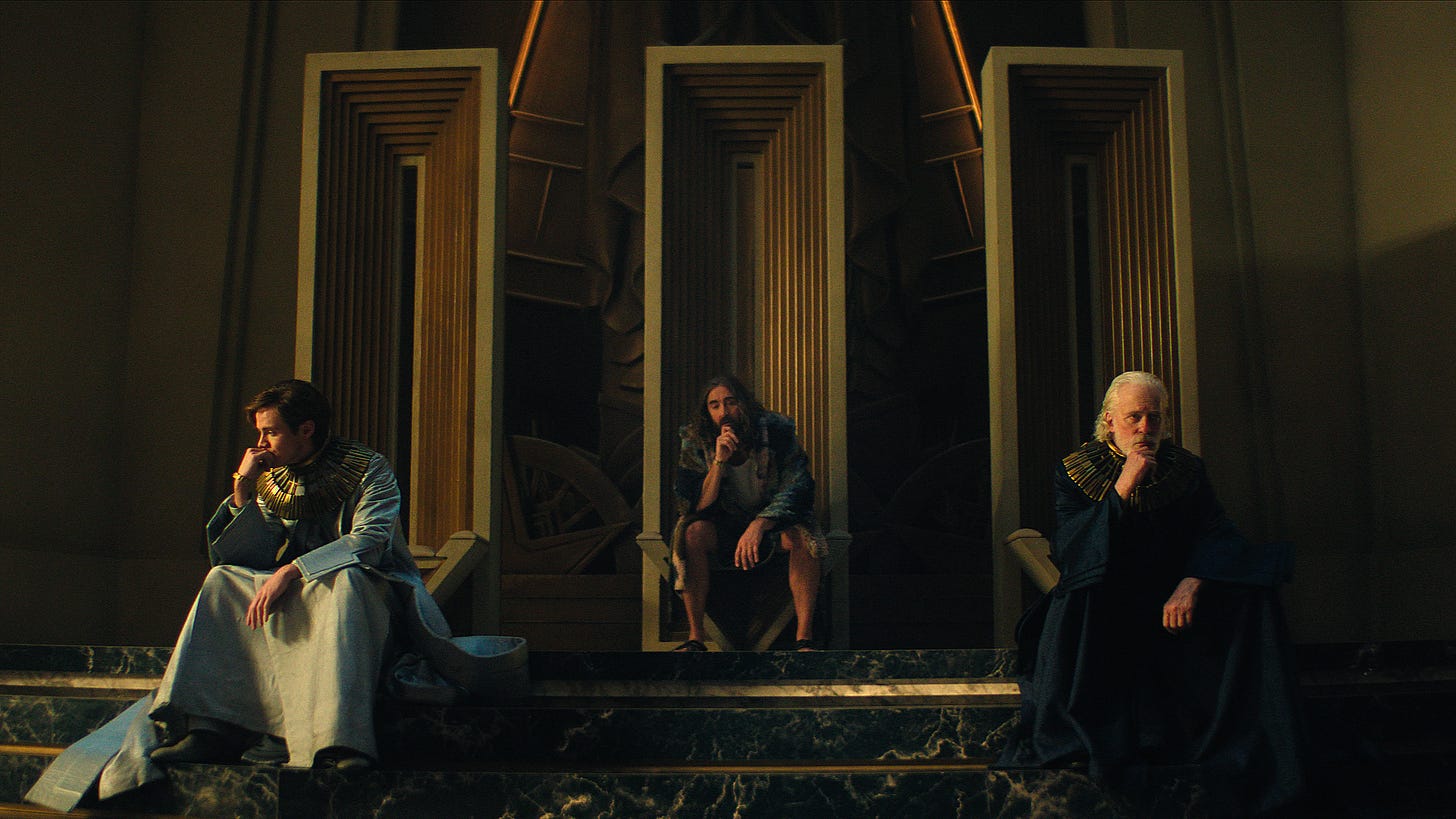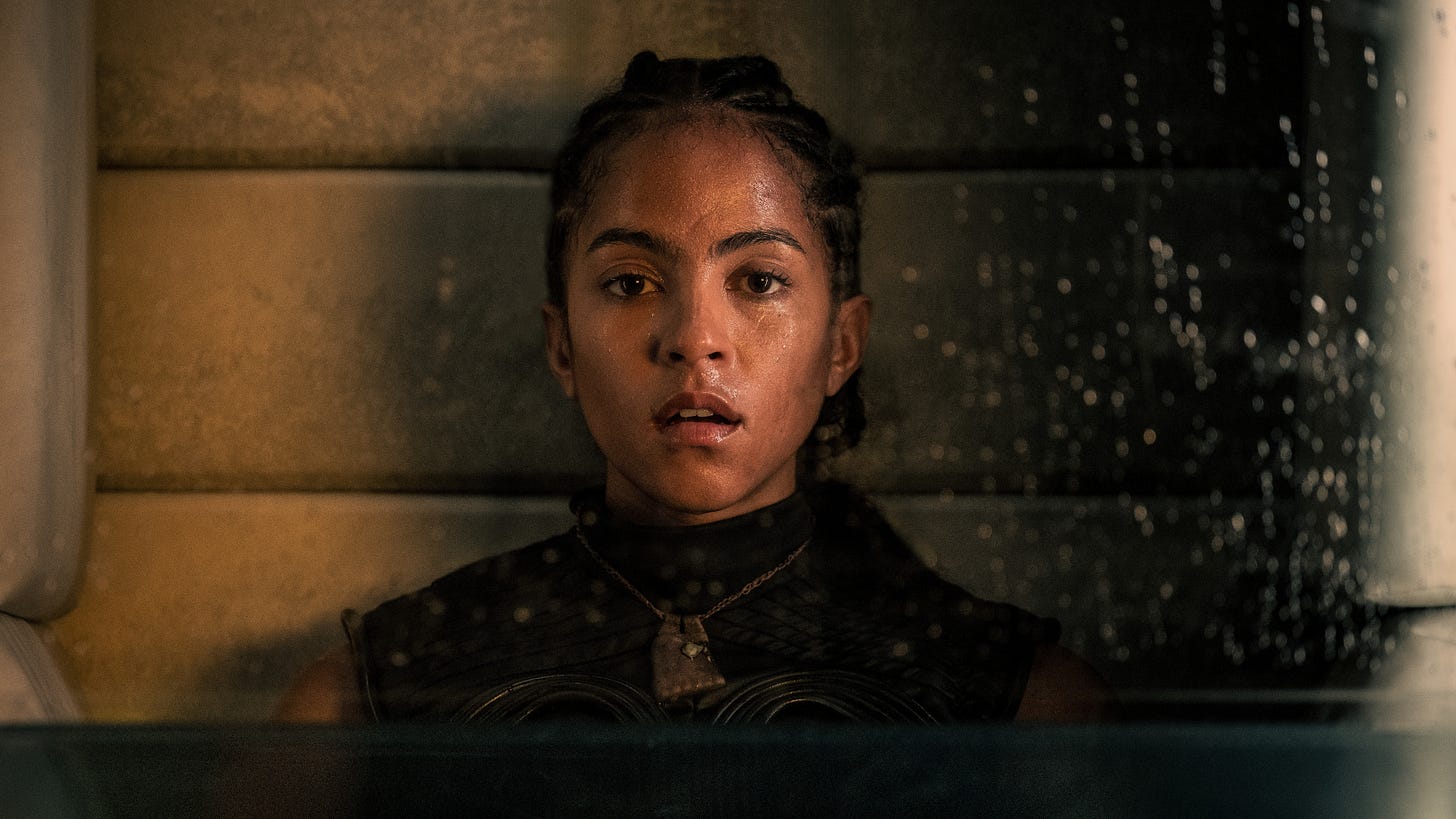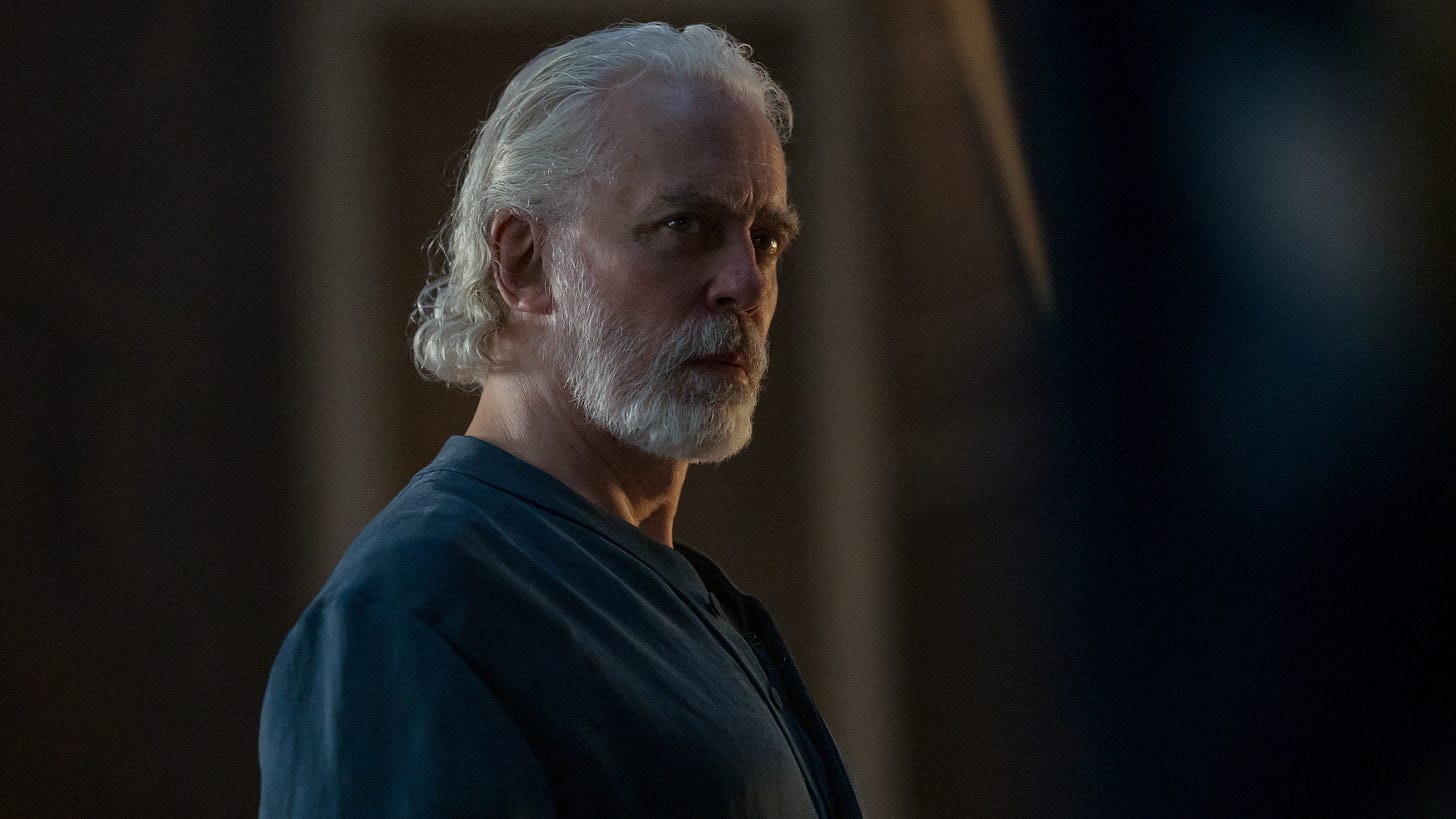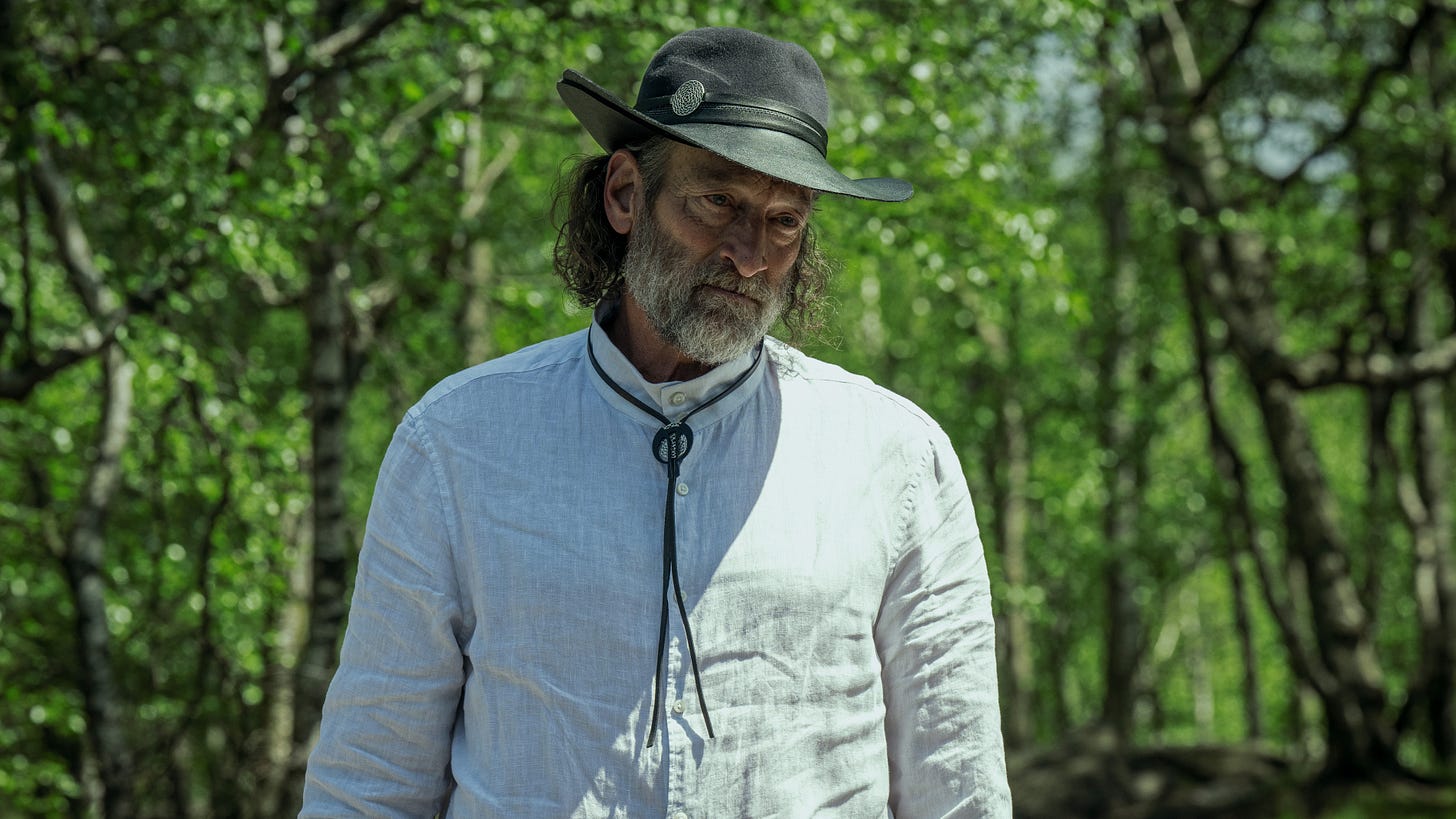Review: 'Foundation' (Season 3)
Unapologetically complex, but absolutely essential science fiction
We are back in the far future of Isaac Asimov’s Foundation universe. Here, humanity’s quest for the stars has long since been reached, and with our species having filled the void, power, as it usually does, corrupted. An Empire rose, governed by the three clones of its founder, Emperor Cleon, in an all-powerful genetic dynasty. Or so it was, at some point.
Always three, there are: snapshots of Emperor Cleon at various stages of his life: young Brother Dawn (played by Cassian Bilton), powerful Brother Day (played by Lee Pace), and wise Brother Dusk (played by Terrence Mann). And as each Brother Dusk nears the end of his life, he is disintegrated, as a new brother Dawn is decanted. The old Dawn becomes the new Day, and the old Day becomes the new Dusk.
And so it goes, for centuries, with the trio, collectively called Empire, running their galactic domains in perfect order and synchronicity. That’s the theory, at least. The system is brutal and effective, yet deeply inhumane and unjust, not just to the people of the galaxy, but also to the Cleons themselves, who are now, in essence, unwilling pawns and puppets to a monarch long dead. And gaoler in this genetic prison: the immortal and ever-present robot Demerzel (played by Laura Birn). Mother, guardian, lover and killer of the Cleons.
Opposing them is the Foundation, an organization started centuries ago by the genius mathematician Hari Seldon (played by Jared Harris) and his protégé Gaal Dornick (played by Lou Llobell). Using a form of ultra-advanced mathematics, and with the help of a crystalline supercomputer and data storage device known as the Prime Radiant, psychohistory—a way of calculating the future—was developed.
Isaac Asimov’s epic science fiction novel series had always been considered too hard and too complex to adapt to the screen. With strong and often complicated themes focusing on history, past versus future, civilization, free will, power (and the corruption of it), and human nature, it is a story that spans centuries. Characters, with some exceptions that we will get into later, come and go, dying off as the timeline jumps centuries at a time. Indeed, it could be argued that there are no main characters in Foundation—to which the Cleons would strongly disagree—but history itself.
With its third season, Foundation has established itself as a highly praised, epic, yet niche, science fiction series. It masterfully adapts its complicated source material, balancing adherence to Asimov’s novels with a narrative suitable for the screen. Created by David S. Goyer and Josh Friedman with a whopping eight seasons in mind, it aims to tell the entire story of Asimov’s Foundation universe.
This third season begins centuries after the previous one, marked by the arrival of The Mule (played by Pilou Asbæk). This dangerous warlord, whom Gaal Dornick foresaw in her dream visions centuries earlier, brings with him a great upheaval—what the Foundation refers to as the Third Crisis.
Undetectable by the Foundation’s psychohistory, The Mule begins his campaign on the pleasure planet Kalgan. This planet, strategically located, lies neutral between the diminished Empire in the galactic center and the strengthened Foundation, which operates from New Terminus across the galactic rim. Using powerful psionic abilities to sweep away all opposition and convert people to his cause, The Mule quickly establishes his fiefdom.
Meanwhile, in the Imperial capital of Trantor in the galactic center, a very different set of Cleons grapple with a diminished Empire. Far from the power-hungry tyrants from previous centuries, the growth of the Foundation on the galactic edge and the increased power of the Galactic Council force the Cleons to share power, showing them, perhaps for the first time in generations, that neither they nor the Empire they govern are all-powerful. And with this realization comes humanity and vulnerability in each Cleon, manifesting in different ways as the waters rise around them.
As the conflict escalates, the secretive Second Foundation, based on the planet Ignis, trains for the coming confrontation with The Mule. Led by Gaal Dornick, who, through cryosleep, endures centuries of dreamscape battles against the tyrant, alongside an aging Hari Seldon, Second Foundation agent Han Pritcher (played by Brandon P. Bell), and the psychic mentor Preem Palver (played by Troy Kotsur), they might just be the last hope in a galaxy quickly heading for the precipice.
This is how the Galaxy stands at the beginning of the season, as every faction scrambles to make sense of the emerging threat of The Mule. And when The Prime Radiant’s ability to show the future of the timeline stops in four months, with nothing than a void of blackness beyond, the threat of a final end looms.
Let’s just take a breather here and admit that it is complicated. Foundation is not a series for the faint of heart. There are a lot of characters and story threads, and while it would be impossible to adapt Asimov’s epic science fiction universe to the screen without making some changes, as I’ve said before when I’ve reviewed the previous seasons, I’m very happy that they didn’t add too much water to the mix.
Having centuries pass between each season might feel jarring at first. Characters come and go, but for others, it presents an opportunity to show different facets, or entirely new versions of familiar figures. The Cleons, for example, are played by the same three actors in each season, with some exceptions for very young Brother Dawns. Cassian Bilton, Lee Pace, and Terrence Mann are all great in their roles as the Cleons, but the real standout here is Pace as Brother Day.
In this time, while the Galactic Empire is diminishing due to an ascendant Foundation and other political mismanagement, Brother Day has largely abdicated his responsibilities to the throne. Instead he spends his days lounging with his lover/drug dealer in the palace gardens, surrounded by cloned animals—including an amazingly cute ferret. Here, we see his human sides like never before. A man, desperate to escape the chains that bind him. To his brothers. To the throne. To the Galactic Empire. Power be damned.
Meanwhile, Brother Dawn is deep in collusion with none other than Gaal Dornick from the Second Foundation. The Mule is coming, and the only way to stop him, or so both conspirators believe, is to work together to surround and destroy him as soon as possible.
And as for Brother Dusk, his time is soon coming when he will “ascend.” Scanning through recordings of previous Brother Dusk’s ascensions in generations past, he sees them all go to their end. Some willingly, stepping into the energy field that disintegrates them into a pile of ash. Some try to run, buying themselves a few more seconds of life before Demerzel, ever present, pushes them unceremoniously into the disintegration beam. And as Brother Dusk watches, he feels the cold fear of death.
But while these Cleons, desperate as they are in their own different ways, might appear more human, vulnerable and even relatable, they are still Cleons—part of the Genetic Dynasty. Underneath the surface lies the capability for cruelty and callousness on an unimaginable scale.
If you have watched the two previous seasons of Foundation, you might know what to expect when it comes to the visual grandeur of Asimov’s universe as it appears on screen. The series goes all in on science fiction.
At the same time, there is an earthiness, an organic feeling to it all. Scenes change from science fiction staples like city-wide planets, massive starships, planet-destroying superweapons to wide-stretching natural landscapes and medieval-like fortresses and temples.
In fact, Asimov’s Foundation series—released between 1951 and 1993, with the author Isaac Asimov passing away in 1992—was widely praised for its revolutionary exploration of sociology, politics, history, and fate on a galactic scale.
The series has been named as one of the primary influences for many later science fiction universes, like George Lucas’ Star Wars, Frank Herbert’s Dune, and even Douglas Adams’ The Hitchhiker’s Guide to the Galaxy series, and it’s easy to see why.
With this new season, Foundation continues its reign as one of the finest science fiction series available on streaming. Its grand ideas, unapologetically massive and complex universe, and faithful adherence to Asimov’s epic novels make it an absolute must-see for any sci-fi enthusiast. It is a series that demands your full attention, inviting reflection not only on its futuristic universe, but also on our own confusing and often terrifying time.
Season 3 of Foundation premiers on Apple TV+ on July 11, 2025.










